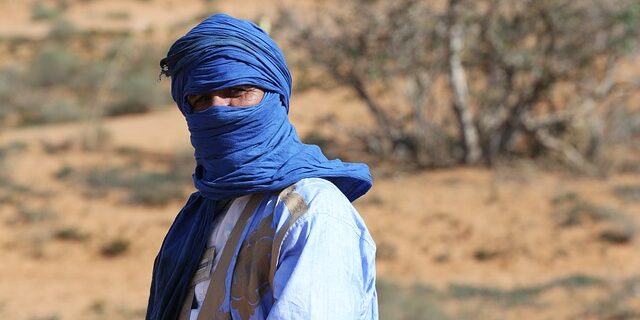It is said that caliph “Al Motasem” used to love poetry and poets. One day, a Bedouin man who was said to be a poet, came to visit the caliph. The caliph granted the Bedouin come in. There he entered, stepping forward and backward honoring the king, and started reciting a poem that he had made for him. It was like a eulogy, the kind that’s made for princes and kings. He liked that eulogy and asked:
“Do you know another one?”
“I do.” he answered.
He started reciting some poems of his own and some other poets’ poems, mentioning their names. The caliph liked that Bedouin and enjoyed his company.
“Take him to the guest house.” he commanded.
It was quite an honor to be in the caliph’s guest house with all its delicacies and fancy food.
That first night, the caliph commanded they bring him in. He stayed up late with the Bedouin, spending the whole night discussing poetry and literature. At the end of the night, everyone went to sleep and the Bedouin headed to the guest house. The next day he spent the whole day in the guest house and at night, after dinner, the caliph called for him again. This continued until he became a companion for the caliph, having both lunch and dinner with him.
At this time, Al Motasem had an envious minister who was always green with envy. He envied that Bedouin who was having lunch and dinner with the caliph and staying up late each night with him.
“This one will obviously take my place.” he thought. “The caliph likes him so much he might get rid of me and name him a courtier in my place if this friendship gets any stronger. I have to think of a way to get rid of this man, otherwise I am doomed.”
He spent days thinking and plotting until he came up with a trap that he thought would be effective, and not only that, but evil, very evil. So, he started acting nice to the Bedouin and hugging and greeting him whenever he met him. He appeared to be befriending him, until one day he invited him to lunch. He made him what is called ‘methawma’, a meal that contains a lot of garlic and onion.
After they finished eating, the Bedouin was about to head out when the minister said to him: “Listen, I advise you to be careful, the caliph doesn’t really like the smell of garlic. Do something about it. Don’t get close when you’re talking to him.”
And then each went on his way. As for the minister, he went running to the palace and since a courtier could enter without asking permission, he entered saying:
“O Caliph, I am your faithful courtier and I don’t accept anyone talking behind your back and saying bad things about you. If they do, I feel as if I’m the one they are talking about, or like it is my wife or my children or my daughter…”
“Who talked behind my back?”
“That Bedouin whom you consider a loyal companion.” he answered. “Pardon me, your grace, you know better than I, but I think it was a bad choice. Such a man doesn’t even deserve being a servant of yours.”
“What did he say?”
“Your grace, I feel ashamed. I feel ashamed, your grace, I can’t tell you.”
“Tell me.”
“Your grace, he actually said: ‘Your caliph has bad breath.'”
“What? You can’t be serious. That dog. That son of the dogs, says this? I have honored him and sent him to the guest house, the house in which I host kings. He’s eating food that he would have never dreamed of. Alright, we’ll see about him.”
He believed the courtier and decided to kill the Bedouin.
The courtier left the caliph’s presence, and after a while, the Bedouin entered. He had also already been authorized to enter without asking permission. As soon as he got close to the caliph and was about to lean forward, he put his tissue to his mouth, and then sat beside him as usual. He was talking to him while putting his tissue to his mouth and was turning his face away, until the caliph was certain about the courtier’s claim. It was now proven to the caliph that he was covering his nose in order not to smell anything. So, he wrote a letter to one of his workers in Nabul or Zaghouan, saying: “Whoever brings you this letter, behead him, no matter who he is.” And then the caliph gave it to the Bedouin and said:
“As for this, take a horse from the stable tomorrow and ride to such and such a town. Meet my worker and give him this letter.”
“Your wish is my command.”
He left the caliph’s presence and came across the courtier who asked:
“What’s this?”
“This is a letter that the caliph gave me to take to the worker so-and-so.” he answered.
The courtier thought hard about it: “He must be going to get something big. I wonder what he’ll give him.”
“What do you say if I free you from this burden and from the bother of traveling? I’ll even give you… Here’s two thousand dinars.”
“Whatever you say, sir courtier.” he answered.
He coughed up two thousand dinars and took the letter from him.
“I’ll only need one day to make it there.” he thought. And then he rode the horse and took the way.
After about two or three days, the caliph asked:
“Where is the courtier? He didn’t come today or yesterday or the day before.”
“He hasn’t show up, your grace.”
“Then go ask about him at his house, he might be sick.”
They had someone ask about him and then were told:
“He’s currently traveling.”
“Alright, how about so-and-so? That Bedouin, have you seen him?”
“We have, your grace.”
“Where?”
“We saw him earlier in such and such hotel.”
“Really? Go bring him now, right away.”
They brought him.
“Where have you been?”
The man sat still out of fear and said:
“Your grace, forgive me, I disobeyed you.”
“How so?”
“Your grace, the day you gave me the letter, I came across the courtier as soon as I left you. He asked: ‘What’s this?’ I told him: ‘A letter to the worker so-and-so.’ He said: ‘Why must you handle this burden? Here let me free you from the bother of traveling, I’ll bring it to him myself.’ I listened to him, your grace, and gave him the letter, but I thought if I stayed in the palace, his grace would ask me: ‘Why didn’t you go?’ So, I rented a room in a hotel and kept waiting, until I’d hear that the courtier was back from traveling. At that time, I’d come to you as if I accomplished the mission.”
The caliph replied: “You know, I am aware you were talking behind my back and saying I had bad breath!”
“Far be it from me to say such a thing, your grace.”
“But that day when you were sitting beside me, you were putting your tissue on your nose!”
“Ah! As for that, your grace, the courtier actually invited me for lunch that day. We had ‘methawma’ and he told me: ‘Be careful, the caliph loathes the smell of garlic.’ So, when I came to you, I was afraid you’d smell a garlic odor on me. I put my tissue over my mouth.”
“Envy eats nothing but its own heart.” said the caliph.
And so the courtier lost his life for envy, and as for the Bedouin, the caliph named him a courtier in his place.
by Arne

